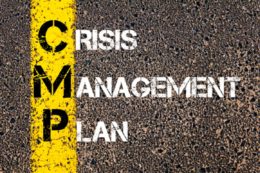


Crisis Leadership: Five Principles for Managing the Unexpected
From Deloitte and The Wall Street Journal:
Domestic terrorism, cyberattacks, power outages, white collar crimes and other catastrophic events are just a few of the potential crises companies can face. While many companies have a crisis plan in place, they may not have actually tested their plans, or the plans may be inadequate. A Deloitte online poll of more than 2,000 C-suite executives, managers, analysts and crisis professionals from U.S. and international companies¹ found that a large percentage of respondents did not know what their biggest gap in crisis preparedness would be. Further, half of respondents were not sure whether the crisis response team had been tested.
“It’s the unseen or unanticipated crises that are potentially the most dangerous,” says Rhoda Woo, a Deloitte Advisory managing director and leader of the U.S. Crisis Management practice at Deloitte & Touche LLP.
“An unanticipated crisis can easily overwhelm contingency mitigation techniques and risk management programs, such as business continuity, disaster recovery, health and safety plans or emergency response. Management can even exacerbate a crisis if bad news is marginalized or otherwise ignored until it’s too late,” Ms. Woo adds.
Two Types of Crises
Crises can be divided into two types: routine and novel.² Routine events³ are the known risks for which organizations can plan and develop procedures. Examples include safety plans for manufacturers, recall plans for food companies and liquidity plans for financial institutions, as well as disaster recovery and security plans for companies across industries.
Novel crises are those risks that exhibit unusual frequency and impact. Organizations typically don’t have plans for such events. Novel crises may be a confluence of two or three events that strike at the same time. Or they may simply be too big or unusual to be imagined.
“In the absence of pre-determined procedures, novel crises—whether they be natural disasters, terror attacks, cyber breaches or malevolence such as shootings or inside sabotage and fraud—can test leadership’s decision-making and strategic-thinking abilities,” says Mary Galligan, a Deloitte Advisory director in the Cyber Risk Services practice at Deloitte & Touche LLP. Of these novel crises, terror attacks are garnering the most concern. When respondents to the online poll were asked which event their organizations were least prepared for, terror topped the list at 36.4%, followed by a cyber breach at 18.3%.
Five Operating Principles for Managing the Unexpected
A crisis puts to the test the decision-making skills of an organization’s management and employees. ”If you are too quick to make a decision, you might be basing the decision on incorrect or inadequate information; by the same token, waiting for the perfect set of data can lead to analysis paralysis and slow decision-making or no decisions being made at all,” says Ms. Woo. “During a crisis senior executives can find themselves overwhelmed by the vast amount of information and the whole information and communications environment,” she adds.
The following five operating principles can help executives manage the unexpected across different types of crises….
For the rest, click here.
Photo Credit: Crisis Management Plan shutterstock_291641099

